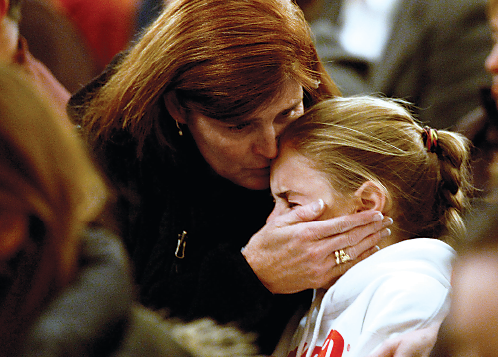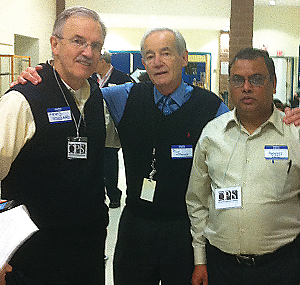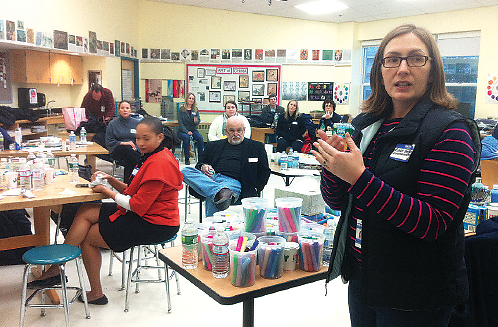Psychiatrists Provide Help, Advice Following Newtown School Murders
Abstract
Local psychiatrists volunteer to help Newtown, Conn., residents recover from last month’s shooting tragedy.
The Connecticut Psychiatric Society (CPS) reacted swiftly to the tragic shooting at Sandy Hook Elementary School in Newtown, Conn., on Friday, December 14.
Society President John Santopietro, M.D., and Disaster Committee Chair Shaukat Khan, M.D., consulted that afternoon with APA experts including members of APA’s Committee on the Psychiatric Dimensions of Disasters.
Within hours, 100 society members responded to Santopietro’s e-mail requesting volunteers to help in the stricken town.

A woman comforts a young girl during a vigil service for victims of the Sandy Hook Elementary School shooting in Newtown, Conn., on December 14. Connecticut Psychiatric Society members were among those who offered their services to the grieving community.
Meanwhile, Khan contacted the Red Cross and the Connecticut State Medical Society to let them know about the CPS volunteers. Khan was already registered with the Red Cross as a mental health volunteer.
By coincidence, the CPS had conducted a disaster-response training session for members just a month earlier. That course was led by Frederick Stoddard, M.D., a clinical professor of psychiatry at Harvard Medical School and a psychiatrist at Massachusetts General Hospital. Stoddard is coauthor with Anand Pandya, M.D., and Craig Katz, M.D., of Disaster Psychiatry Readiness, Evaluation, and Treatment (American Psychiatric Publishing).
The class covered such points as the psychiatric impact of disasters, grief and resilience, psychological first aid, and the postacute stages of a disaster.
“The training helped prepare us for the situation at Newtown, but, of course, not entirely,” said Khan, a psychiatrist at the VA Connecticut Health Systemin West Haven and a clinical assistant professor at Yale.
“You can’t be completely prepared for something like this,” said Stoddard. “It is such an atrocity.”

Psychiatrists gathered at Reed Intermediate School in Newtown, Conn., to assist community members after December’s shooting. From left: Frederick Stoddard, M.D., of Massachusetts General Hospital; Irvin Jennings, M.D., executive and medical director of nonprofit Family and Children’s Aid; and Shaukat Khan, M.D., disaster chair of the Connecticut Psychiatric Society.
Perhaps the most helpful aspect of the training in light of the later Newtown tragedy was the inclusion of a speaker from the American Red Cross, said CPS President-elect Carolyn Drazinic, M.D., Ph.D., an assistant professor of psychiatry at the University of Connecticut. The speaker explained how the Red Cross coordinates the overall response to disasters, an insight that was helpful in integrating the CPS volunteers into the general emergency response.
By Saturday afternoon, Khan had completed a needs assessment. Working through the Red Cross and state and local health agencies, the society arranged for at least two psychiatrists to be on duty along with other mental health professionals for three-hour shifts from 7 a.m. to 7 p.m. at a crisis-response center in Newtown. On Sunday, Drazinic and colleagues met with more than 300 children and adults.
“The handoffs between professionals is critically important and were done at Newtown in a collegial and careful ways,” said Stoddard, who drove from Boston to consult with the CPS.
More such help will be needed in the future to contain the suffering and anxiety, said Santopietro, chief medical officer at Community Health Resources in Windsor, Conn.
“I consider this to be the psychological equivalent of a nuclear blast,” said Santopietro. “The immediate damage is unthinkable, and there is some rate of decay, but the fallout will continue for weeks and months and years.”

Robyn Hoffman, A.P.R.N., of Family and Children’s Aid coordinates mental health volunteers at the Reed Intermediate School after the Newtown shooting.
The CPS will continue working with health agencies in that long-term effort.
“Concentric waves of psychological pain are rippling out from Newtown, and we want people to get excellent care,” said Santopietro. Pausing between meetings and phone calls in the days just after the shooting, he reflected on the task ahead for the society’s members.
“This is the work we do,” he said. “We deal with human suffering and the complexity of the brain and human behavior. We deal with communities and human relationships. We help people through personal, psychological, family, and community crises. This is psychiatry.” ■



